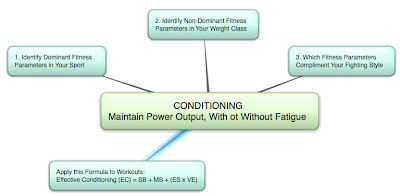“Develop the dominant
fitness parameters in your weight class, then focus on weight class weaknesses
“
Last article we used
Nick Diaz to illustrate that it may be a good idea to take your fighting style
into consideration when designing your conditioning regimen. Now it’s time to
talk about weight-classes. We believe that there are strengths and weaknesses
of different weightclasses, and focusing on the weakness of the weightclass is
the key to success.
Lets illustrate this
through a comparison of a lightweight fighter and a heavyweight fighter. There
are certain fitness parameters that a heavyweight is expected to possess, and
certain fitness parameters which a lightweight is expected to possess. It’s no surprise if a heavyweight is
really strong. It’s expected. It is a surprise if a lightweight is strong.
Similarly, speed for a heavyweight is far from common (Mike Tyson), but speed
for a smaller fighter is less impressive.
First, make sure that
you have developed the dominant fitness parameters. If the opponents in your
weight class are strong, make sure you aren’t weak. If the opponents in your
weight class are quick, make sure you aren’t slow. You don’t have to be the
strongest, or the quickest, but you do have to be able to hang in there and be
competitive. THEN, focus on developing the fitness parameters that your weight
class isn’t strong at. A strong lightweight fighter can control someone who has
good conditioning. A heavyweight with speed, can hit their opponent who is
strong. If you see areas where your opponents are weak, develop them!
Time to revise the
conditioning tips we’ve covered over the last week…
